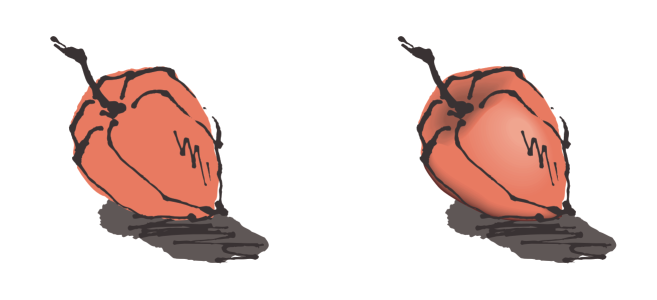Quick links to procedures on this page:
CorelDRAW lets you create blends, such as straight-line blends, blends along a path, and compound blends. Blends are often used for creating realistic shadows and highlights in objects.
The highlights and shadows in the object on the right were created by using blends.
A straight-line blend shows a progression in shape and size from one object to another. The outline and fill colors of the intermediate objects progress along a straight-line path across the color spectrum. The outlines of intermediate objects show a gradual progression in thickness and shape.
After you create a blend, you can copy or clone its settings to other objects. When you copy a blend, the object takes on all the blend-related settings, except for the outline and fill attributes. When you clone a blend, changes you make to the original blend (also called the master) are applied to the clone.
Straight-line blends can be used to create graphics with a glass-like appearance. The rollover button (left) contains a blend of tightly overlapped blended objects.
You can fit objects along part or all of a path’s shape, and you can add one or more objects to a blend to create a compound blend.
The straight-line blend (top) is fitted to a curved path (bottom).
You can change the appearance of a blend by adjusting the number and spacing of its intermediate objects, the blend’s color progression, the nodes the blends map to, the blend’s path, and the start and end objects. You can fuse the components of a split or compound blend to create a single object.
This compound blend consists of three blends.
You can also split and remove a blend.
By mapping nodes, you can control the appearance of a blend. Two nodes on the polygon are mapped to two nodes of a star shape, showing a more gradual transition (bottom).

You can also blend objects by using the Blend docker (Effects  Blend).
Blend).
| 2 . |
Click Effects, and click one of the following: |

You can’t copy or clone a compound blend.

You can also use the Attributes eyedropper tool  to copy a blend. For more information, see To copy effects from one object to another.
to copy a blend. For more information, see To copy effects from one object to another.

You can set object and color acceleration rates by clicking the Object and color acceleration button  on the property bar and moving the corresponding slider.
on the property bar and moving the corresponding slider.
| 2 . |
Click the Blend spacing button  on the property bar. on the property bar. |

If you have used the Blend along full path command, the Blend spacing button is unavailable.

You can set object and color acceleration rates by clicking the Object and color acceleration button  on the property bar and moving the corresponding slider.
on the property bar and moving the corresponding slider.

You can’t create color progressions by using blended objects filled with bitmaps, texture, pattern, or PostScript fills.

You can set how fast the object’s colors transform from the first to the last object by clicking the Object and color acceleration button  on the property bar and moving the corresponding sliders.
on the property bar and moving the corresponding sliders.
| 2 . |
Click the More blend options button  on the property bar, and click Map nodes. on the property bar, and click Map nodes. |
|
|
|
|
|
Select a blend, click the Starting and ending objects button  on the property bar, and click Show start or Show end.
|
|
|
Select a blend, click the Starting and ending objects button on the property bar, and click New start or New end. Click an object outside the blend that you want to use as the start or end of the blend.
|
|
|
Hold down Ctrl, click a middle object in a blend, and then click a start or end object. Click the More blend options button  on the property bar. If you have selected the start object, click the Fuse start button  . If you have selected the end object, click the Fuse end button  .
|

You can reverse the direction of the blend by clicking Object  Order
Order  Reverse order.
Reverse order.
| 2 . |
Click the Path properties button  on the property bar, and click New path. on the property bar, and click New path. |

To select the blend path, click the Path properties button  , and click Show path.
, and click Show path.
| 2 . |
Click the More blend options button  on the property bar. on the property bar. |

You can’t split a blend at the intermediate object that is immediately adjacent to the start or end object.
| 2 . |
Click Effects  Clear blend. Clear blend. |

You can also remove a selected blend by clicking the Clear blend button  on the property bar.
on the property bar.

Not all suite components documented in this Help are available in our Trial, Academic, and OEM versions. Unavailable components may include Corel applications, product features, third-party utilities, and extra content files.
Copyright 2018 Corel Corporation. All rights reserved.

![]() Blend).
Blend). to copy a blend. For more information, see To copy effects from one object to another.
on the property bar and moving the corresponding slider.
on the property bar and moving the corresponding slider.
on the property bar and moving the corresponding sliders.
![]() Order
Order ![]() Reverse order.
Reverse order., and click Show path.
on the property bar.
![]()